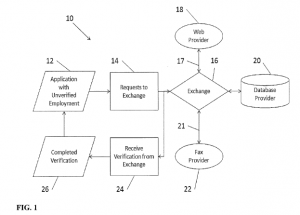Indianapolis, IN– Tenstreet’s patent infringement complaint against DriverReach was previously discussed here. In its Complaint, Tenstreet accuses DriverReach of infringing Patent No. 8,145,575 (“the ‘575 patent”) for “Peer to Peer Sharing of Job Applicant Information”. DriverReach previously moved to dismiss the suit arguing that the asserted patent was invalid. Dkt-14 Motion to Dismiss
On February 26, 2019, the Court of Appeals for the Federal Circuit issued it decision in University of Florida Research Foundation, Inc. v. General Electric Company, No. 2018-1284. In that case the Federal Circuit found that the asserted claims of U.S. Patent No. 7,062,251 (“the ’251 Patent”) were not patentable under 35 U.S.C. § 101. This was because the Federal Circuit stated that automating “‘pen and paper methodologies’ to conserve human resources and minimize errors”, is not patentable. Specifically, a patent claim using terms like “receiving” data, “converting” the data into a specific format, “performing at least one programmatic action” on the data, and “presenting results,” was just an abstract idea because it was a “quintessential ‘do it on a computer’ patent: it acknowledges that data . . . was previously collected, analyzed, manipulated, and displayed manually, and it simply proposes doing so with a computer.”
In addition, the Federal Circuit rejected the University of Florida’s argument that the “converting” limitation claimed a specific improvement to existing technology. The court said that neither “the patent, nor its claims, explains how the drivers do the conversion.”
 Indiana Intellectual Property Law News
Indiana Intellectual Property Law News





